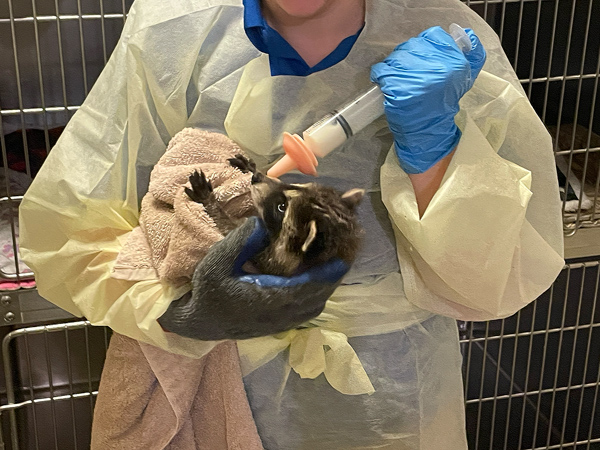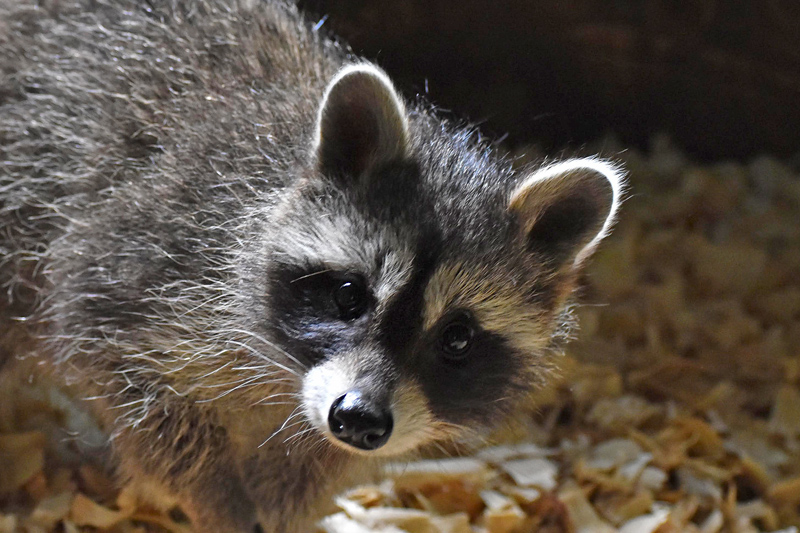Raccoons fishing for minnows.
Every summer, the Northwoods Wildlife Center in Minocqua, Wisconsin, becomes a temporary home for dozens of baby raccoons. These adorable yet mischievous creatures arrive at our center in need of care, and it’s our job to nurse them back to health and prepare them for life back in the wild. But why do so many baby raccoons need our help? And why shouldn’t people try to raise these wild animals as pets? Let’s dive into the details.
Why Baby Raccoons Become Orphaned, Sick, or Injured
These raccoons found their way to the Northwoods Wildlife Center for several reasons. Whether their mothers were hit by cars or the babies were removed by well-meaning homeowners trying to evict a raccoon from their attic or shed, most of our baby raccoons were orphaned. Without their mother’s guidance and protection, baby raccoons are vulnerable and need human intervention to survive.
Sometimes, raccoons become sick due to malnutrition, parasites, or infections they pick up in the wild. These health issues can quickly become life-threatening if not treated. Injuries are another common reason we admit raccoons—whether they’ve fallen from a tree, attacked by a dog, or tangled with another wild animal, these injuries require expert care.
The Intensive Care Raccoons Require
 Caring for these raccoons was no small task—it is always a time-intensive process that requires patience, skill, and a lot of dedication. Thankfully, our amazing interns, here learning the ins and outs of wildlife rehabilitation under the supervision of licensed rehabilitators, were up for the challenge
Caring for these raccoons was no small task—it is always a time-intensive process that requires patience, skill, and a lot of dedication. Thankfully, our amazing interns, here learning the ins and outs of wildlife rehabilitation under the supervision of licensed rehabilitators, were up for the challenge
Feeding baby raccoons involves regular bottle feedings, and as they grow, they need to be weaned onto solid food. It’s not just about feeding them, though—raccoons are highly intelligent and curious animals, which means they need plenty of mental stimulation and enrichment to keep them healthy and happy. This might include puzzles, toys, fishing for minnows, and time to practice their climbing and foraging skills.
But one of the biggest challenges in caring for raccoons is keeping them contained! These little escape artists are known for their ability to figure out how to open cages, unlatch doors, and generally cause chaos if they get the chance. Staying one step ahead of them takes a watchful eye and quick reflexes.
Orphaned raccoons being released into the wild.
Remember, Raccoons Don’t Make Good Pets
Given their intelligence and playful nature, it might be tempting to think that raccoons would make fun pets. However, there are several reasons why this is a bad idea.
Firstly, raccoons are wild animals with instincts and behaviors that don’t align well with domestic life. They can be aggressive, particularly as they reach adulthood, and their powerful claws and teeth can do serious damage.
Moreover, raccoons require specialized care that most people simply aren’t equipped to provide. Their diets are complex, and without proper nutrition, they can suffer from serious health problems. Raccoons also carry diseases that can be transmitted to humans, such as rabies and roundworms, making them potentially dangerous to have in your home.
Finally, it’s important to remember that wild animals belong in the wild. No matter how much love and care you give them, raccoons raised in captivity often struggle to adapt when released back into their natural habitat. At Northwoods Wildlife Center, our goal is to prepare these animals for a life in the wild, where they belong.
At the Northwoods Wildlife Center, we’re proud of the work we do to help baby raccoons and other wildlife get back on their feet. But we couldn’t do it without the dedication of our interns and the support of our community and people like you.

